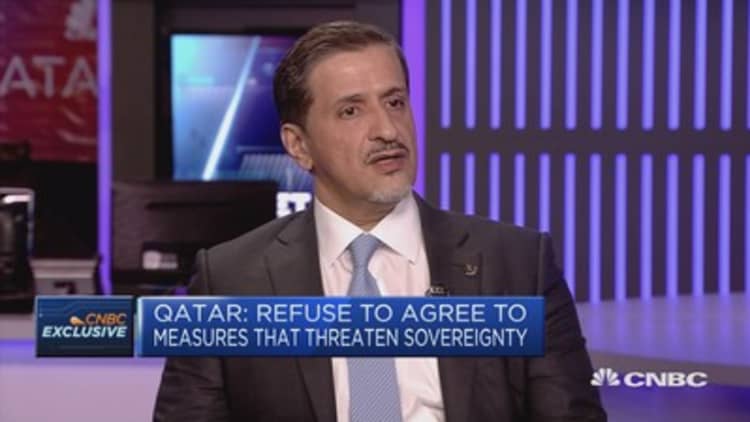Qatar's decision last week to grant residency rights to expatriate workers is merely a "PR stunt," Mohamed Abdelmeguid, analyst at the Economist Intelligence Unit, told CNBC via telephone.
Abdelmeguid said that the decision was "another way of trying to shore up confidence among expats and Qataris," following the government's realization that its sanctioned economy cannot rely on the mere 300,000 Qatari nationals in the state of approximately 2.6 million people.
The Qatari government approved a bill to grant certain expats residency rights last week. Non-Qataris are eligible if certain conditions are met: they are the children of Qatari women married to foreigners, or have performed "great services to the state," or else have required "special competencies," according to the Qatar News Agency (QNA).
The QNA detailed that a permanent residency card grants a number of privileges such as the use of education and health care institutions, and being second priority for recruiting after Qatari nationals themselves. Those granted the status can also own property, "in accordance with the executive decisions to be issued by the Council of Ministers."

Allison Wood, consultant for global risk analysis in the Middle East and North Africa at Control Risks, pointed out to CNBC via telephone that the decision would reveal a "divide between skilled and unskilled workers" in the country. Considering the conditions for permanent residency, it is unlikely that most construction workers or nannies will qualify.
Wood pointed out that given the ongoing diplomatic rift and subsequent economic embargo imposed on Qatar by a group of fellow Gulf Corporation Countries (GCC) including Saudi Arabia, the timing of the decision was "probably not a coincidence." Instead, it was at least in part intended to "position Qatar as a more open, forward-looking nation," as the first of the GCC countries to make such a move.
Abdelmeguid played down suggestions that Qatar was a pioneer in its decision, pointing out that Saudi Arabia, as part of its Vision 2030 initiative to diversify its economy away from oil, had pledged to implement a similar system by 2021.
The state's attempt to win favor among the international community was a source of skepticism for Firas Modad, terrorism and Middle East analyst at IHS, who said that the ruling was a convenient distraction from the human rights abuses of lower paid construction workers in Qatar, such as those currently building World Cup stadiums for 2022.
"The decision was aimed at better paid, high skill workers, who are far less likely to suffer rights abuses. As such, it doesn't address the issue conditions of foreign construction workers for which Qatar has been criticized by international rights groups," he told CNBC via e-mail.

Abdelmeguid said that the conditions of the permanent residency were vague, and suggested that the decision was "not going to be ruled out on a mass scale."
Gulf countries typically have high numbers of expat workers, but are strict about residency rights.
Qatar, alongside several other Gulf nations including Bahrain, Kuwait, and Saudi Arabia, operate a system of expat employment known as "kafala," which only enables foreign workers under an in-country sponsor who are responsible for their legal status and visa.
But as to whether Qatar's GCC antagonists would respond to the residency law with similar measures, Wood said that she was "skeptical they want to play a tit for tat game."
The Qatari embassy in London was not immediately available for comment when contacted by CNBC.

